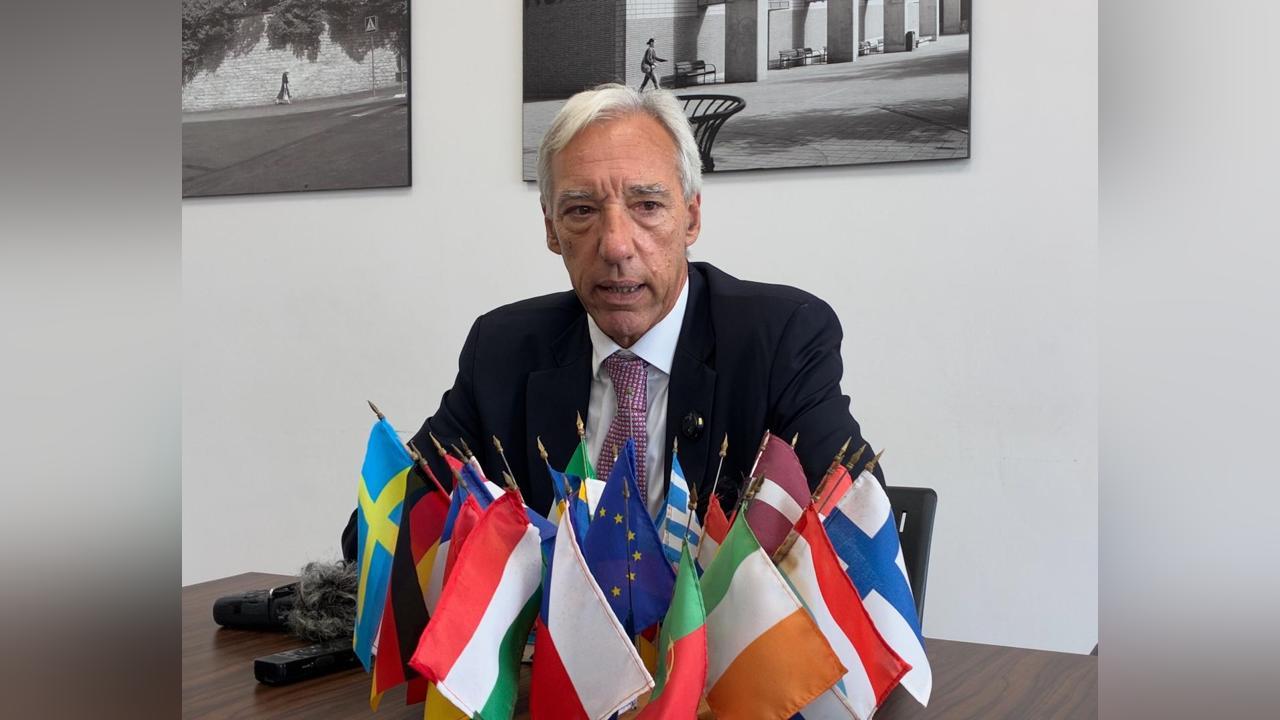Africa-Press – Liberia. João Gomes Cravinho, the European Union’s Special Representative for the Sahel, says disinformation is “a major threat” to democratic societies. Credit: Anthony Stephens/New Narratives.
Summary:
João Gomes Cravinho, the EU’s Special Representative for the Sahel, visiting the country, warned that disinformation is “a major threat” to democracy.
Speaking at the end of a three-day visit to Monrovia, where he met government and civil society leaders, Cravinho noted that Liberia could use its seat on the U.N. Security Council to support stability in the Sahel.
A top European Union diplomat warned Tuesday that disinformation poses a growing danger to democracies, as waves of Russian-backed propaganda from neighboring Sahel states reverberate across West Africa.
João Gomes Cravinho, the European Union’s Special Representative for the Sahel spoke at a press conference in Monrovia at the close of a three-day visit to Liberia, during which he met with senior government officials and civil society leaders.
“Disinformation is a major threat that democratic societies have to find ways of dealing with,” said Cravinho. He declined a request to address the rhetoric of Ibrahim Traoré, Burkina Faso’s military leader who is one of the region’s major voices of anti-West sentiment. Traoré, often accused of amplifying Russian-backed, anti-Western narratives, has become a prominent voice in a broader campaign that portrays Moscow as Africa’s liberator and the West as a fading colonial power. Videos glorifying Traoré — many of them AI-generated — have flooded social media platforms, resonating particularly with young audiences. Cravinho talked generally of the growing threat.
“We’ve seen how democracies in various parts of the world have been negatively affected by disinformation,” he said. “Disinformation is aimed at destabilizing and weakening democratic structures and promoting non-democratic forms of government.”
Traoré is the latest of a growing rank of military coup leaders in the region. He seized power in 2022. Mali’s Assimi Goïta, Niger’s Abdourahamane Tchiani and Guinea’s Mamady Doumbouya have all seized power from democratically elected leaders in recent years. Russia, through the private military organization known as the Wagner Group — now rebranded — allegedly backed the coups.
In September 2023, Mali, Niger and Burkina Faso quit the Economic Community of West African States and formed the Alliance of Sahel States, a pact that has consolidated junta rule and accelerated anti-Western rhetoric. Guinea has not joined but has leaned toward Moscow and echoed some of the same themes.
Traoré, Burkina Faso’s president is a key figure of anti-west rthoric of disinformation. Credit: Washington Post.
Liberia shares West Africa’s fragile information environment, and experts warn that disinformation does not stop at borders. Campaigns rooted in local grievances — and amplified through social media — have already inflamed election tensions, fueled protests and undermined trust in Liberian institutions. Foreign state actors, including Russia, China and Qatar, are seen as accelerating the pace of manipulation. Experts estimate that disinformation campaigns in the region have quadrupled in recent years.
The Special Representative’s message signals that disinformation is now a major priority for the European Union, one of Liberia’s key international partners. The European Union and European governments including Sweden, Germany and Ireland, have backed media literacy campaigns, fact-checking initiatives and civic education programs designed to blunt the impact of false narratives in Liberia. Nona Deprez, EU Ambassador to Liberia, said it had worked on media capacity including data protection and fact-checking and would continue to work “more structural aspects of media landscape here in Liberia.”
Deprez said the EU will also continue to work with the Liberian government to address the drug epidemic, and youth unemployment through Technical Vocational Training, describing it as “a very practical way to provide the youth with the skills that are needed to fill the jobs” and that they were also “working with the private sector to ensure that the skills that are taught to the youth are those that are needed by the private sector.”
Nona Deprez, the European Union’s ambassador to Liberia says they will contoine to support the capacility of the local media to counter disinformation. Credit:Anthony Stephens/New Narratives.
Experts say climate change is another major issue fueling insecurity in Liberia and other African countries. A 2024 survey by FrontPage Africa/New Narratives found that climate change was driving migration and fueling food insecurity in Liberia. Cravinho said climate change was still “a factor” here.
He also highlighted the influx of Burkinabes, fleeing turmoil in their own country and encroaching upon Liberian farmland, especially in Grand Gedeh county, which borders Ivory Coast. He said such invasions risk igniting conflict.
“I was quite struck by a comment made by the Inspector General of Police of Liberia that, ‘disputes over land are the most important trigger of violence in Liberia,’” said Cravinho.
Cravinho said Liberia could also use its seat on the United Nations Security Council, which it takes up in January 2026 for two years, to help stabilize the crisis-ridden Sahel region.
“It is necessary for us to work closely with Liberia to ensure that the situation in the Sahel stabilizes,” said Cravinho. “Otherwise the consequences will be felt not just in Liberia, they will be felt also in Europe.”
Source: FrontPageAfrica
For More News And Analysis About Liberia Follow Africa-Press






